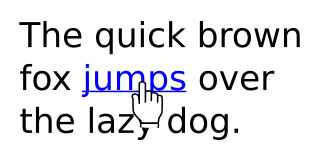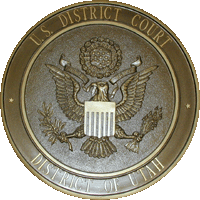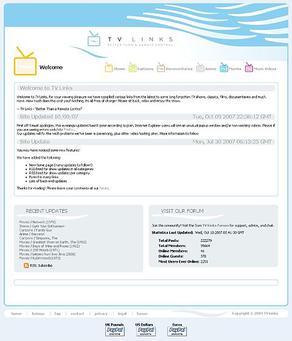Related Research Articles

In computing, a hyperlink, or simply a link, is a digital reference to data that the user can follow or be guided to by clicking or tapping. A hyperlink points to a whole document or to a specific element within a document. Hypertext is text with hyperlinks. The text that is linked from is known as anchor text. A software system that is used for viewing and creating hypertext is a hypertext system, and to create a hyperlink is to hyperlink. A user following hyperlinks is said to navigate or browse the hypertext.

Michael Robertson is the founder and former CEO of MP3.com, an Internet music site. In the years following his departure from MP3.com Robertson has launched several companies, including Linspire, SIPphone, MP3tunes, and Ajax13. He is also founder of OnRad.io, a search engine for radio and DAR.fm, a website for recording audio from internet radio.
In the context of the World Wide Web, deep linking is the use of a hyperlink that links to a specific, generally searchable or indexed, piece of web content on a website, rather than the website's home page. The URL contains all the information needed to point to a particular item. Deep linking is different from mobile deep linking, which refers to directly linking to in-app content using a non-HTTP URI.
In computer networks, download means to receive data from a remote system, typically a server such as a web server, an FTP server, an email server, or other similar systems. This contrasts with uploading, where data is sent to a remote server.
Ticketmaster Entertainment, LLC is an American ticket sales and distribution company based in Beverly Hills, California with operations in many countries around the world. In 2010, it merged with Live Nation under the name Live Nation Entertainment.

Ticket resale is the act of reselling tickets for admission to events. Tickets are bought from licensed sellers and then sold for a price determined by the individual or company in possession of the tickets. Tickets sold through secondary sources may be sold for less or more than their face value depending on demand, which tends to vary as the event date approaches. When the supply of tickets for a given event available through authorized ticket sellers is depleted, the event is considered "sold out," generally increasing the market value for any tickets on offer through secondary sellers. Ticket resale is common in both sporting and musical events.

The Sony BMG CD copy protection rootkit scandal was a scandal focused on the implementation of copy protection measures on about 22 million CDs distributed by Sony BMG in 2005. When inserted into a computer, the CDs installed one of two pieces of software that provided a form of digital rights management (DRM) by modifying the operating system to interfere with CD copying. Neither program could easily be uninstalled, and they created vulnerabilities that were exploited by unrelated malware. One of the programs would install and "phone home" with reports on the user's private listening habits, even if the user refused its end-user license agreement (EULA), while the other was not mentioned in the EULA at all. Both programs contained code from several pieces of copylefted free software in an apparent infringement of copyright, and configured the operating system to hide the software's existence, leading to both programs being classified as rootkits.
The multinational technology corporation Apple Inc. has been a participant in various legal proceedings and claims since it began operation and, like its competitors and peers, engages in litigation in its normal course of business for a variety of reasons. In particular, Apple is known for and promotes itself as actively and aggressively enforcing its intellectual property interests. From the 1980s to the present, Apple has been plaintiff or defendant in civil actions in the United States and other countries. Some of these actions have determined significant case law for the information technology industry and many have captured the attention of the public and media. Apple's litigation generally involves intellectual property disputes, but the company has also been a party in lawsuits that include antitrust claims, consumer actions, commercial unfair trade practice suits, defamation claims, and corporate espionage, among other matters.

FACTnet, also known as Fight Against Coercive Tactics Network, co-founded by Robert Penny and Lawrence Wollersheim, was a Colorado-based anti-cult organization with the stated aim of educating and facilitating communication about destructive mind control. Coercive tactics, or coercive psychological systems, are defined on their website as "unethical mind control such as brainwashing, thought reform, destructive persuasion and coercive persuasion".

Intellectual Reserve, Inc. v. Utah Lighthouse Ministry, Inc., 75 F. Supp. 2d 1290, was a United States district court decision on the subject of deep linking and contributory infringement of copyright.
File sharing is the practice of distributing or providing access to digital media, such as computer programs, multimedia, program files, documents or electronic books/magazines. It involves various legal aspects as it is often used to exchange data that is copyrighted or licensed.

TV Links was a user contributed online video directory for television programmes, films, and music videos. In a similar style to BitTorrent trackers such as The Pirate Bay, video content was not hosted by TV Links. Instead, videos were hosted by third-party video sharing websites. The website was operated as a hobby by David Rock of Cheltenham, England.
Microsoft has been involved in numerous high-profile legal matters that involved litigation over the history of the company, including cases against the United States, the European Union, and competitors.
Browsewrap is a term used in Internet law to refer to a contract or license agreement covering access to or use of materials on a web site or downloadable product. In a browse-wrap agreement, the terms and conditions of use for a website or other downloadable product are posted on the website, typically as a hyperlink at the bottom of the screen. Unlike a clickwrap agreement, where the user must manifest assent to the terms and conditions by clicking on an "I agree" box, a browse-wrap agreement does not require this type of express manifestation of assent. Rather, a web-site user purportedly gives their consent simply by using the product — such as by entering the website or downloading software.
In copyright law, the legal status of hyperlinking and that of framing concern how courts address two different but related Web technologies. In large part, the legal issues concern use of these technologies to create or facilitate public access to proprietary media content — such as portions of commercial websites. When hyperlinking and framing have the effect of distributing, and creating routes for the distribution of content (information) that does not come from the proprietors of the Web pages affected by these practices, the proprietors often seek the aid of courts to suppress the conduct, particularly when the effect of the conduct is to disrupt or circumvent the proprietors' mechanisms for receiving financial compensation.

Facebook, Inc. v. Power Ventures, Inc. is a lawsuit brought by Facebook in the United States District Court for the Northern District of California alleging that Power Ventures Inc., a third-party platform, collected user information from Facebook and displayed it on their own website. Facebook claimed violations of the CAN-SPAM Act, the Computer Fraud and Abuse Act ("CFAA"), and the California Comprehensive Computer Data Access and Fraud Act. According to Facebook, Power Ventures Inc. made copies of Facebook's website during the process of extracting user information. Facebook argued that this process causes both direct and indirect copyright infringement. In addition, Facebook alleged this process constitutes a violation of the Digital Millennium Copyright Act ("DMCA"). Finally, Facebook also asserted claims of both state and federal trademark infringement, as well as a claim under California's Unfair Competition Law ("UCL").
Anton Vickerman is a British disc jockey and website operator. He was the operator of Surfthechannel.com, a link site. He was sentenced to four years in jail following a privately funded legal campaign after British public prosecutors refused to try him. It has been called the first high-profile successful prosecution for the film industry. He is the first UK citizen sent to prison for linking to films and TV shows.
Ira P. Rothken is an American high technology attorney and computer scientist who has handled numerous cases of first impression involving the internet and new technologies.

Nguyen v Barnes & Noble, Inc., 763 F.3d 1171, was a United States Court of Appeals for the Ninth Circuit decision in which the Court ruled that Barnes & Noble's 2011 Terms of Use agreement, presented in a browsewrap manner via hyperlinks alone, was not enforceable since it failed to offer users reasonable notice of the terms. The decision set an important precedent on the future design and presentation of online contracts for consumer-facing e-commerce sites.
Google has been involved in multiple lawsuits over issues such as privacy, advertising, intellectual property and various Google services such as Google Books and YouTube. The company's legal department expanded from one to nearly 100 lawyers in the first five years of business, and by 2014 had grown to around 400 lawyers. Google's Chief Legal Officer is Senior Vice President of Corporate Development David Drummond.
References
- Footnotes
- ↑ Ross 2000, section 6-14
- 1 2 Macaluso, Nora (August 15, 2000). "Tickets.com Wins Round in Hyperlink Dispute". E-Commerce Times. Archived from the original on August 22, 2012. Retrieved August 22, 2012.
- 1 2 Greene, Thomas C (March 31, 2000). "US judge upholds hyperlinks: Copyrights were never intended to promote advertising". The Register . Archived from the original on August 22, 2012. Retrieved August 22, 2012.
- ↑ Sood 2001 , p. 309
- ↑ Singh 2004 , p. 1306
- 1 2 3 Winn & Wright 2001 , p. 31
- 1 2 Stapleton 2002 , section 2-40
- ↑ Delta & Matsuura 2008 , section 6-51
- 1 2 3 4 5 Tedeschi, Bob (August 10, 1999). "Ticketmaster Sues Again Over Links". The New York Times . Archived from the original on March 31, 2017. Retrieved August 22, 2012.
- ↑ Dale & Lewis 2010 , p. 1182
- ↑ Dunn, Ashley (May 21, 1997). "Hey, You! Who You Pointin' At?". The New York Times . Archived from the original on September 17, 2002. Retrieved August 22, 2012.
- ↑ Sood 2001 , pp. 309–310
- ↑ Gaw, Jonathan (August 12, 1999). "Ticketmaster Sues Internet Rival". Los Angeles Times . Los Angeles. Archived from the original on August 22, 2012. Retrieved August 22, 2012.
- 1 2 3 4 5 Harrison Dinniss, Heather A (2001). "Tools of the Trade: Intellectual Property Issues in Electronic Commerce Tools". Victoria University of Wellington Law Review. 32 (1). Wellington, New Zealand: Victoria University of Wellington. Archived from the original on August 22, 2012. Retrieved August 22, 2012.
- ↑ Sood 2001 , p. 310
- 1 2 3 4 5 6 Fields, Robin; Huffstutter, P.J. (March 29, 2000). "Judge Rules Online Firms May Link to Rival Web Sites". Los Angeles Times . Los Angeles. Archived from the original on August 22, 2012. Retrieved August 22, 2012.
- ↑ Kennedy, DeBrae (October 25, 2000). "Deep Linking Your Way into a Lawsuit". Internet Law Journal. Archived from the original on December 9, 2000.
- 1 2 Crawford 2010 , p. 135
- 1 2 3 4 Quinto 2001 , section 10-29
- ↑ Scassa & Deturbide 2004 , p. 359
- ↑ Finley, Michelle (March 30, 2000). "Attention Editors: Deep Link Away". Wired . Archived from the original on August 22, 2012. Retrieved August 22, 2012.
- 1 2 Rosencrance, Linda (March 31, 2000). "Ticketmaster accuses Tickets.com of misrepresenting judge's 'deep-linking' ruling". Computerworld . Archived from the original on January 19, 2013. Retrieved August 22, 2012.
- ↑ Klosek 2003 , p. 40
- 1 2 Kaplan, Carl S. (April 7, 2000). "Legality of 'Deep Linking' Remains Deeply Complicated". The New York Times . Archived from the original on August 22, 2012. Retrieved August 22, 2012.
- ↑ "Judge allows start-ups to link to big rivals". CNET. Associated Press. March 29, 2000. Archived from the original on August 15, 2000.
- ↑ "Judge Makes Preliminary Ruling in Ticketmaster vs. Tickets.com Case". Newsbytes . March 28, 2000. Archived from the original on August 22, 2012. Retrieved August 22, 2012.
- ↑ Scott 2009 , section 2-300
- ↑ Klosek 2003 , p. 41
- ↑ Bortz, Tammy (June 2000). "Hyperlinking and Deep-linking: The Ticketmaster Case". Tech Werks. Werksmans. Archived from the original on February 3, 2001. Retrieved February 8, 2017.
- ↑ Bonisteel, Steven (August 16, 2000). "Ticketmaster Gets Setback In "Deep-Linking" Suit". Computer User . Archived from the original on October 16, 2002.
- ↑ Minow & Lipinski 2003 , p. 91
- ↑ Sinrod, Eric J. (September 5, 2000). "To link or not to link?". Upside . Archived from the original on April 17, 2001.
- ↑ Isenberg 2002 , pp. 28–29
- ↑ Budnick & Baron 2012 , pp. 163–164
- ↑ See Ticketmaster Corp. v. Tickets.com, Inc., 248 F.3d 1173 (9th Cir. 2001), as cited in Ross 2000, section 6-14
- ↑ Klosek 2003 , p. 42
- ↑ White, Caroline (May 31, 2002). "Deep linking = deep trouble?: How copyright laws are being exploited by the big players to intimidate their smaller rivals". Caroline White. Archived from the original on August 22, 2012. Retrieved August 22, 2012.
- ↑ Cullen, Drew (July 20, 2003). "Deep links are legal in Germany: Sensible people, the Germans". Cullen, Drew. Archived from the original on August 22, 2012. Retrieved August 22, 2012.
- ↑ Kubiszyn, Margaret Smith (May 2000). "Emerging Legal Guidance on 'Deep Linking'". GigaLaw. Archived from the original on August 10, 2002.
- Bibliography
- Budnick, Dean; Baron, Josh (2012). Ticket Masters: The Rise of the Concert Industry and How the Public Got Scalped (1st ed.). New York: Penguin Group. ISBN 978-1-10158-055-4.
- Crawford, Tad (2010) [First published by Hawthorn Books in 1976]. Legal Guide for the Visual Artist (5th ed.). New York: Allworth Press (Skyhorse Publishing). ISBN 978-1-58115-742-0.
- Dale, Nell; Lewis, John (2010) [First published by Jones & Bartlett Publishers in 2002]. Computer Science Illuminated. Sudbury, Massachusetts: Jones & Bartlett Publishers. ISBN 978-0-76377-646-6.
- Delta, George B.; Matsuura, Jeffrey H. (2008). Law of the Internet. Vol. 2 (2nd ed.). Frederick, Maryland: Aspen Publishers Online (Wolters Kluwer). ISBN 978-0-73557-559-2.
- Isenberg, Doug (2002). The GigaLaw Guide to Internet Law: The One-Stop Legal Resource for Conducting Business Online. New York: Random House Digital. ISBN 0-81299-198-2.
- Klosek, Jacqueline (2003). The Legal Guide to E-Business . Westport, Connecticut: Praeger Publishers (Greenwood Publishing Group). ISBN 1-56720-403-1.
- Minow, Mary; Lipinski, Tomas A. (2003). The Library's Legal Answer Book . Chicago: ALA Editions (American Library Association). ISBN 0-83890-828-4.
- Quinto, David W. (2001). Law of Internet Disputes. New York: Aspen Publishers Online (Wolters Kluwer). ISBN 0-73552-592-7.
- Ross, Terence P. (2000). Intellectual Property Law: Damages and Remedies. New York: Law Journal Press (ALM. ISBN 1-58852-094-3.
- Scassa, Teresa; Deturbide, Michael Eugene (2004). Electronic Commerce and Internet Law in Canada. Toronto: CCH Canadian Limited. ISBN 1-55367-370-0.
- Scott, Michael D. (2009) [First published in 1991 by Prentice Hall Law & Business (Prentice Hall)]. Scott on Information Technology Law (3rd ed.). Frederick, Maryland: Aspen Publishers Online (Wolters Kluwer). ISBN 978-0-73556-524-1.
- Singh, Munindar (2004). The Practical Handbook of Internet Computing. Boca Raton, Florida: CRC Press. ISBN 1-58488-381-2.
- Sood, Vivek (2001). Cyber Law Simplified. New Delhi: Tata McGraw-Hill. ISBN 0-07043-506-5.
- Stapleton, Laura Lee (2002). E-Copyright Law Handbook. New York: Aspen Publishers Online (Wolters Kluwer). ISBN 0-73552-944-2.
- Winn, Jane K.; Wright, Benjamín (2001). The Law of Electronic Commerce (4th ed.). Gaithersburg, Maryland: Aspen Publishers Online (Wolters Kluwer). ISBN 0-73551-648-0.